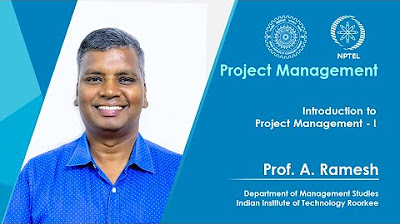Siklus Hidup Proyek - Manajemen Proyek TI
Summary
TLDRThis video provides an in-depth overview of the Project Management Life Cycle, covering its four essential phases: Initiation, Planning, Execution, and Closure. Each phase is explored in detail, highlighting key activities, deliverables, and the importance of stakeholder communication and risk management. The process starts with defining project goals and ends with collecting feedback for future improvements. Through the example of a kitchen renovation project, the script illustrates how these phases ensure the successful completion of a project while maintaining quality, meeting objectives, and achieving client satisfaction.
Takeaways
- 😀 The project management lifecycle consists of distinct phases: Initiation, Planning, Execution, and Closure.
- 😀 Each phase produces deliverables that are used in subsequent phases to ensure the project's success.
- 😀 In the Initiation phase, project goals, stakeholder needs, and the overall project scope are identified.
- 😀 The Planning phase focuses on defining the project's scope, resources, budget, and timeline, and creating a detailed project plan.
- 😀 During Execution, the project plan is carried out, and risks are analyzed to ensure smooth progress.
- 😀 Effective communication with stakeholders and the team is crucial during the Execution phase for project success.
- 😀 The deliverables produced during Execution should align with the project schedule and expectations.
- 😀 The Closure phase evaluates the project’s success, gathers feedback from stakeholders, and ensures that all objectives have been met.
- 😀 Lesson learned during project closure can be used to improve the management of future projects.
- 😀 Risk management is essential throughout the project lifecycle, especially in the Execution phase, where unforeseen issues may arise.
- 😀 Ensuring customer satisfaction and meeting project goals during Closure is vital for the project's reputation and future opportunities.
Q & A
What is the project life cycle in project management?
-The project life cycle consists of several phases, each of which produces tangible results, also known as deliverables, that are used in subsequent phases. These phases typically include initiation, planning, execution, and closure.
What happens in the initiation phase of a project?
-In the initiation phase, the project's goals, success criteria, and stakeholders are identified. This phase sets the foundation for the project by defining what the project aims to solve and who is involved.
What are deliverables, and why are they important?
-Deliverables are tangible outcomes or outputs produced at each phase of the project, and they are essential because they verify the progress of the project. Each phase's deliverables must be validated before moving forward.
What does the planning phase of a project involve?
-In the planning phase, detailed project plans are created, which include defining the scope, budget, resources, timelines, and roles. This phase ensures that everyone involved in the project understands their responsibilities and the project's objectives.
How does a project manager handle risks during the execution phase?
-During the execution phase, a project manager should constantly monitor and analyze risks, such as delays or shortages, and communicate with the team and stakeholders to mitigate potential issues that could impact the project's timeline and success.
What is the significance of stakeholder communication in the execution phase?
-Effective communication with stakeholders during the execution phase is crucial because it ensures that everyone involved is aware of the project's progress, challenges, and any necessary adjustments, helping to maintain alignment and support.
What happens during the closure phase of a project?
-The closure phase involves evaluating whether the project's goals have been met, gathering feedback from stakeholders, and assessing customer satisfaction. This phase is also where lessons learned are documented to improve future projects.
Why is stakeholder involvement crucial throughout the project lifecycle?
-Stakeholder involvement is essential because stakeholders provide valuable feedback and ensure that the project aligns with their expectations and needs. Regular engagement helps address any concerns and ensures that the project remains on track.
How does a project manager ensure the quality of deliverables?
-A project manager ensures the quality of deliverables by defining clear criteria in the planning phase, overseeing execution closely, and verifying that deliverables meet the required standards before moving to the next phase.
What are some common challenges a project manager might face during the execution phase?
-Common challenges during the execution phase include managing unexpected delays, resource shortages, scope changes, and maintaining team motivation. A project manager must proactively address these challenges to keep the project on track.
Outlines

Esta sección está disponible solo para usuarios con suscripción. Por favor, mejora tu plan para acceder a esta parte.
Mejorar ahoraMindmap

Esta sección está disponible solo para usuarios con suscripción. Por favor, mejora tu plan para acceder a esta parte.
Mejorar ahoraKeywords

Esta sección está disponible solo para usuarios con suscripción. Por favor, mejora tu plan para acceder a esta parte.
Mejorar ahoraHighlights

Esta sección está disponible solo para usuarios con suscripción. Por favor, mejora tu plan para acceder a esta parte.
Mejorar ahoraTranscripts

Esta sección está disponible solo para usuarios con suscripción. Por favor, mejora tu plan para acceder a esta parte.
Mejorar ahoraVer Más Videos Relacionados

Project Structures & Life Cycles | Google Project Management Certificate

010 How does a project start and how does it evolve What a project's main stages

Project Management Life Cycle | #bscit #spm #bsccs

5 Tahapan Manajemen Proyek || 5 Siklus Hidup Proyek - Project Life Cycles Phases of The Project

Lecture 01: Introduction to Project Management - I

Systems Analysis & Design - Ch 1 - Project Initation
5.0 / 5 (0 votes)
